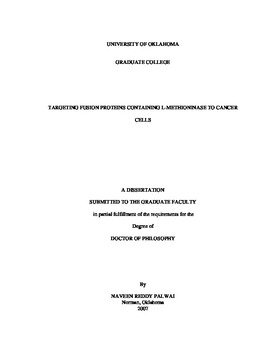| dc.contributor.advisor | Harrison, Roger G., | en_US |
| dc.contributor.author | Palwai, Naveen Reddy. | en_US |
| dc.date.accessioned | 2013-08-16T12:21:01Z | |
| dc.date.available | 2013-08-16T12:21:01Z | |
| dc.date.issued | 2007 | en_US |
| dc.identifier.uri | https://hdl.handle.net/11244/1300 | |
| dc.description.abstract | The methioninase-annexin V fusion protein bound specifically to phosphatidylserine (PS) immobilized on plastic plates, as well as on the surface of MCF-7 cancer cells in which PS was induced to be on the surface by the addition of hydrogen peroxide. | en_US |
| dc.description.abstract | The influence of the fusion protein on the growth and motility of human breast cancer cells, SK-LU-1 human lung cancer cells, and PC-3 human prostate cancer cells was examined using a culture wounding assay. ATF-methioninase inhibited the proliferation and migration of all cancer cell lines. For MCF-7 breast cancer cells, the inhibition by ATF-methioninase was much greater than for either free L-methioninase or mutated ATF-methioninase (mutated to give inactive enzyme). TGF-methioninase inhibited the proliferation and migration in MCF-7 and PC-3 cancer cells. However, the inhibition was significantly greater for ATF-methioninase compared to TGF-methioninase, especially at treatment days 2 and 3. | en_US |
| dc.description.abstract | ATF-methioninase binding to MCF-7 cells was measured by immunocytochemical localization. MCF-7 tumor xenograft growth was measured in nude mice for the mice treated with ATF-methioninase and L-methioninase. Treatment of s.c. implanted MCF-7 breast cancer cells mouse xenografts with ATF-methioninase gave significantly more tumor regression when compared to mouse xenografts treated with L-methioninase alone or with the vehicle control. | en_US |
| dc.description.abstract | It has been shown that methionine depletion inhibits tumor cell growth and reduces tumor cell survival. The main purpose of this project is to examine three fusion proteins for targeting human cancer cells selectively and inhibiting the migration and proliferation of the cancer cells. The fusion proteins studied are ATF-methioninase (amino-terminal fragment of urokinase, amino acids 1-49, linked to the amino terminus of L-methioninase fro Pseudomonas putida ), TGF-methioinase (human transforming growth factor-alpha linked to L-methioninase), and methioninase-annexin V (L-methioninase linked to the amino terminus of human annexin V). The three fusion proteins were expressed as soluble proteins and purified to near homogeneity. Flash freezing and followed by lyophilization was found to be most effective way to store fusion protein samples. | en_US |
| dc.format.extent | xii, 126 leaves : | en_US |
| dc.subject | Health Sciences, Pharmacy. | en_US |
| dc.subject | Engineering, Chemical. | en_US |
| dc.subject | Cancer cells Growth. | en_US |
| dc.subject | Proteins. | en_US |
| dc.subject | Methionine. | en_US |
| dc.subject | Engineering, Biomedical. | en_US |
| dc.subject | Cancer cells Motility. | en_US |
| dc.title | Targeting fusion proteins containing L-methioninase to cancer cells. | en_US |
| dc.type | Thesis | en_US |
| dc.thesis.degree | Ph.D. | en_US |
| dc.thesis.degreeDiscipline | School of Chemical, Biological and Materials Engineering | en_US |
| dc.note | Source: Dissertation Abstracts International, Volume: 69-01, Section: B, page: 0471. | en_US |
| dc.note | Adviser: Roger G. Harrison. | en_US |
| ou.identifier | (UMI)AAI3291933 | en_US |
| ou.group | College of Engineering::School of Chemical, Biological and Materials Engineering | |
